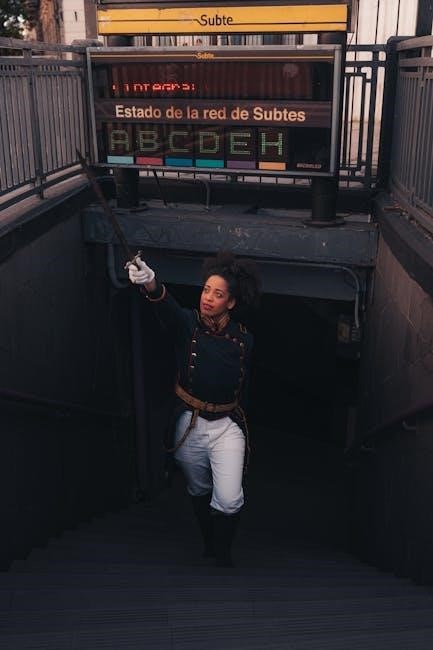Blade Runner 2049 Screenplay⁚ A Deep Dive
The Blade Runner 2049 screenplay is a masterful example of how to write a sci-fi sequel. If you want to continue reading screenplays, we have similar titles like Star Wars, The Usual Suspects, and No Country For Old Man in our screenplay database. Browse and download PDFs for all of our scripts…
Exploring the World of Blade Runner 2049
The Blade Runner 2049 screenplay plunges us into a visually stunning and deeply complex future, where the lines between human and artificial life are blurred. The script meticulously crafts a dystopian world that is both familiar and unsettling, filled with advanced technology, social inequality, and profound questions about identity and humanity. The screenplay vividly paints a picture of a Los Angeles in 2049, shrouded in perpetual rain and a constant sense of unease. The city is a sprawling metropolis where towering structures cast long shadows, reflecting the stark contrast between the wealthy elite and the marginalized populace. The script also delves into the inner workings of the LAPD’s Blade Runner unit, exploring their role in policing the city and maintaining control over the burgeoning replicant population. We witness the brutal efficiency of these officers, their unwavering commitment to upholding the law, and the moral complexities they face when dealing with the line between human and synthetic life. The screenplay masterfully blends action sequences with philosophical dialogue, creating a world that is both thrilling and thought-provoking. By exploring themes of artificial intelligence, identity, and the nature of humanity, the Blade Runner 2049 screenplay transports us to a world that is both captivating and deeply unsettling, leaving a lasting impact on the reader.
The Origins of the Script
The Blade Runner 2049 screenplay emerged from a collaborative effort between Hampton Fancher, who co-wrote the original Blade Runner, and Michael Green, known for his work on Logan and Green Lantern. The script was based on a story by Fancher, drawing inspiration from the world established in Ridley Scott’s 1982 film and Philip K. Dick’s novel, Do Androids Dream of Electric Sheep? The creative team aimed to create a sequel that would honor the legacy of the original while forging its own unique identity. The process of crafting the screenplay involved extensive research and development, ensuring that the world and characters felt both familiar and fresh. The writers drew upon the themes and ideas explored in the original, delving deeper into the complexities of artificial intelligence, the nature of humanity, and the consequences of technological advancements. The screenplay was also heavily influenced by Denis Villeneuve’s vision for the film, who brought his signature style of cinematic storytelling and visual grandeur to the project; The result is a screenplay that is both a worthy successor to the original Blade Runner and a captivating standalone work, seamlessly blending elements of science fiction, noir, and philosophical exploration. The Blade Runner 2049 screenplay is a testament to the collaborative efforts of its creators, resulting in a script that is both engaging and thought-provoking.
The Plot⁚ A Sequel That Surpasses the Original

The Blade Runner 2049 screenplay masterfully weaves a compelling narrative that expands upon the themes and world established in its predecessor. Thirty years after the events of the first film, a new blade runner, LAPD Officer K, discovers a long-buried secret that threatens to plunge the remaining remnants of society into chaos. Driven by his discovery, K embarks on a perilous quest to find Rick Deckard, a former blade runner who has been missing for three decades. The screenplay deftly explores the complexities of identity, memory, and the blurred lines between humans and replicants. K’s search for Deckard leads him through a labyrinthine world filled with danger and intrigue, forcing him to confront his own mortality and the true nature of his existence. The screenplay deftly interweaves elements of mystery, suspense, and philosophical reflection, creating a compelling and thought-provoking narrative that surpasses the original in its scope and ambition. The plot unfolds with meticulous pacing, keeping viewers on the edge of their seats while simultaneously prompting them to ponder the deeper implications of the story. The Blade Runner 2049 screenplay is a testament to the power of storytelling, showcasing a masterful blend of action, intrigue, and philosophical depth. It is a sequel that not only honors the legacy of its predecessor but also stands as a remarkable work of science fiction in its own right.
Character Development and Themes
The Blade Runner 2049 screenplay delves into the complexities of character development and explores profound themes that resonate with the human condition. The screenplay masterfully crafts Officer K, a new blade runner, as a character grappling with his identity and purpose in a world where the lines between human and artificial intelligence are blurred. K’s journey of self-discovery unfolds as he confronts the nature of his existence and the implications of his memories. The screenplay also portrays the nuanced relationship between K and his superior, Lieutenant Joshi, a woman navigating a world where societal structures are crumbling. Their dynamic highlights the struggle for power and control in a dystopian future. The screenplay further examines the themes of memory, identity, and the meaning of humanity through its exploration of the character of Rick Deckard, a former blade runner who has been missing for decades. Deckard’s reappearance raises questions about his past and the true nature of his existence, further blurring the lines between human and replicant. The screenplay masterfully weaves these themes into the narrative, prompting viewers to reflect on the nature of consciousness, the search for meaning, and the enduring power of human connection in a technologically advanced world. The Blade Runner 2049 screenplay is a testament to the power of character development and thematic exploration, creating a story that lingers in the mind long after the credits roll.
The Visual Spectacle⁚ From Page to Screen
The Blade Runner 2049 screenplay, while brimming with rich dialogue and compelling characters, also serves as a blueprint for a visually stunning film. The script meticulously crafts a world of stark contrasts and breathtaking landscapes, offering a glimpse into a future where technology and nature clash. The screenplay meticulously describes the neon-drenched cityscape of Los Angeles, with its towering skyscrapers and rain-soaked streets, creating a sense of both wonder and unease. The script vividly paints the desolate beauty of the abandoned farms and sprawling wastelands outside the city, adding a layer of realism to the film’s dystopian setting. The screenplay also emphasizes the importance of lighting and color, using descriptions of harsh shadows and vibrant hues to create a visually arresting experience. The script’s attention to detail allows for a seamless transition from the page to the screen, bringing the dystopian world of Blade Runner 2049 to life with an unparalleled level of visual fidelity. Through the lens of the screenplay, the film’s director, Denis Villeneuve, was able to translate the script’s evocative descriptions into a visual masterpiece that captured the imagination and left a lasting impression on audiences.
Key Scenes and Dialogue
The Blade Runner 2049 screenplay is peppered with unforgettable scenes and dialogue that have become iconic in the realm of sci-fi cinema. One such moment is the poignant scene where Officer K, played by Ryan Gosling, encounters a holographic memory of his childhood, a poignant reminder of his artificial origins. The screenplay’s dialogue, penned by Hampton Fancher and Michael Green, is full of philosophical depth and poetic prose, leaving a lasting impact on the viewer. The scene where K confronts his creator, Niander Wallace, is a masterclass in tense dialogue, exploring the themes of creation, control, and the very essence of humanity. The screenplay also features a powerful exchange between K and Rick Deckard (Harrison Ford), where they confront their past and grapple with the implications of their existence. The dialogue is both thought-provoking and emotionally resonant, reflecting the complex moral dilemmas at the heart of the film. The Blade Runner 2049 screenplay masterfully weaves together dialogue and action, creating a compelling narrative that continues to resonate with audiences years after its release.

The Legacy of the Screenplay
The Blade Runner 2049 screenplay has left an indelible mark on the world of science fiction filmmaking. It serves as a testament to the power of a well-crafted script to create a visually stunning and emotionally resonant cinematic experience. Its influence can be seen in subsequent sci-fi films that explore similar themes of artificial intelligence, existentialism, and the future of humanity. The screenplay’s intricate plot, complex characters, and thought-provoking dialogue have inspired countless discussions and analyses, cementing its place as a landmark in the genre. The Blade Runner 2049 screenplay has also had a significant impact on the world of screenwriting, serving as a model for aspiring writers seeking to create compelling and complex narratives. Its intricate structure, nuanced dialogue, and masterful use of visual storytelling have been studied and emulated by countless writers, ensuring its legacy as a source of inspiration for generations to come. The screenplay’s enduring popularity is a testament to its enduring power to captivate and challenge audiences, solidifying its place as a cornerstone of the sci-fi canon.
Where to Find the Blade Runner 2049 Screenplay PDF
For those eager to delve into the intricacies of the Blade Runner 2049 screenplay, several online platforms offer access to the PDF. The Internet Archive, a digital library of books, movies, and more, houses a copy of the screenplay, available for free download. This version, marked as public domain, provides a valuable resource for those seeking to study the script’s structure, dialogue, and themes. Additionally, Screenwriters Network (SWN), a website dedicated to screenwriting, offers a free PDF download of the Blade Runner 2049 screenplay. SWN’s platform serves as a comprehensive resource for aspiring screenwriters, providing access to a diverse collection of scripts, including notable titles like Blade Runner 2049. These online repositories provide convenient access to the screenplay, enabling enthusiasts and aspiring writers to explore the creative process behind this cinematic masterpiece.
Reading the Screenplay for Free
Accessing the Blade Runner 2049 screenplay for free is readily available online. Several websites and digital libraries offer free access to the PDF, allowing readers to delve into the script’s details without any cost. The Internet Archive, a renowned digital repository, provides a free download of the screenplay, allowing users to explore its contents at their convenience. Screenwriters Network (SWN), dedicated to screenwriting, also makes the Blade Runner 2049 screenplay available for free download, enabling aspiring writers to study its structure and dialogue. These platforms provide valuable resources for those seeking to immerse themselves in the world of Blade Runner 2049, offering a glimpse into the creative process behind the film’s compelling narrative and visual spectacle.
Analyzing the Screenplay⁚ A Masterclass in Sci-Fi
The Blade Runner 2049 screenplay stands as a testament to the art of crafting a compelling sci-fi narrative. Its depth and complexity are evident in the intricate plot, nuanced character development, and thought-provoking themes. The script masterfully explores the philosophical questions surrounding artificial intelligence, humanity’s place in a rapidly changing world, and the nature of memory and identity. The dialogue is both poetic and insightful, reflecting the film’s dystopian setting and the characters’ existential struggles. The screenplay seamlessly blends action and introspection, creating a captivating experience for the reader, while also offering valuable lessons in storytelling for aspiring screenwriters. Its structure and pacing are meticulously crafted, keeping the reader engaged from beginning to end, and its exploration of complex themes makes it a valuable resource for those seeking to understand the power of narrative in sci-fi cinema.
The Impact of the Screenplay on the Film
The Blade Runner 2049 screenplay profoundly shaped the film’s visual and thematic landscape. Hampton Fancher and Michael Green’s script provided a blueprint for Denis Villeneuve’s directorial vision, translating the complex narrative into a visually stunning and emotionally resonant cinematic experience. The screenplay’s evocative language, which paints vivid pictures of a dystopian future, inspired Roger Deakins’ breathtaking cinematography, transforming the script’s words into breathtaking visuals. The screenplay’s exploration of philosophical themes, such as the nature of humanity and the consequences of technological advancement, guided Villeneuve’s direction, shaping the film’s profound impact on the viewer. The screenplay’s rich dialogue, full of poignant reflections on identity and memory, fueled the performances of Ryan Gosling and Harrison Ford, lending depth and authenticity to their characters. The screenplay’s carefully crafted pacing, shifting between action and contemplation, ensured a captivating and immersive experience for the audience.
Blade Runner 2049⁚ A Cinematic Masterpiece
The Blade Runner 2049 screenplay, a testament to the power of words to create worlds, stands as a vital component of the film’s success. It’s a blueprint for a visually stunning and emotionally resonant cinematic experience, a testament to the power of words to create worlds. The screenplay’s poetic language, its exploration of complex themes, and its rich dialogue are all hallmarks of a masterpiece. The script’s evocative prose inspired Roger Deakins’ breathtaking cinematography, transforming the script’s words into breathtaking visuals. The screenplay’s exploration of philosophical themes, such as the nature of humanity and the consequences of technological advancement, guided Villeneuve’s direction, shaping the film’s profound impact on the viewer. The screenplay’s carefully crafted pacing, shifting between action and contemplation, ensured a captivating and immersive experience for the audience. Blade Runner 2049 is a testament to the power of a well-crafted screenplay to elevate a film from mere entertainment to a cinematic masterpiece.



